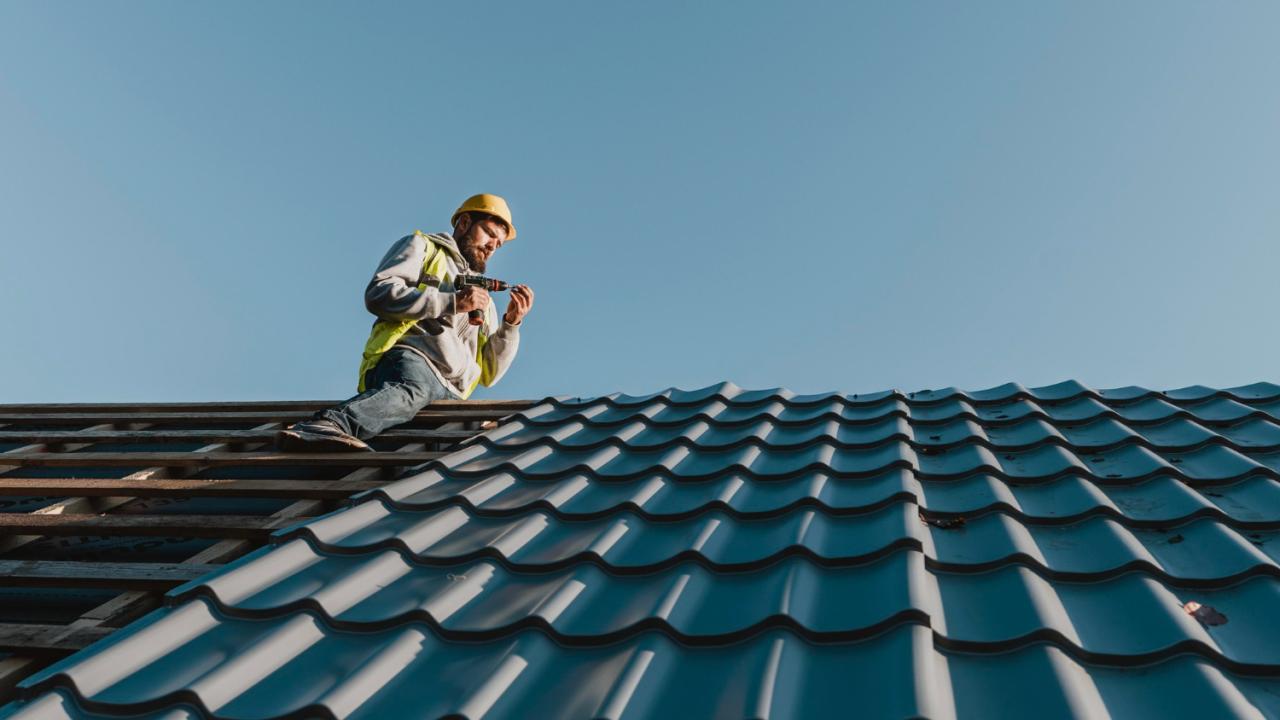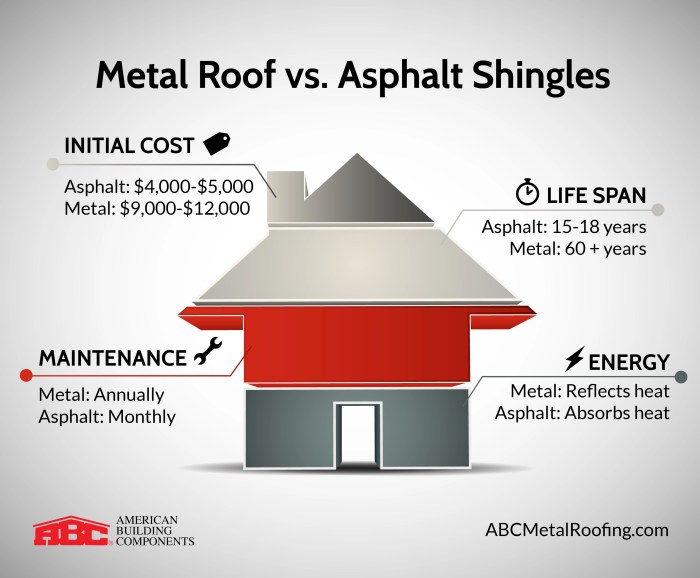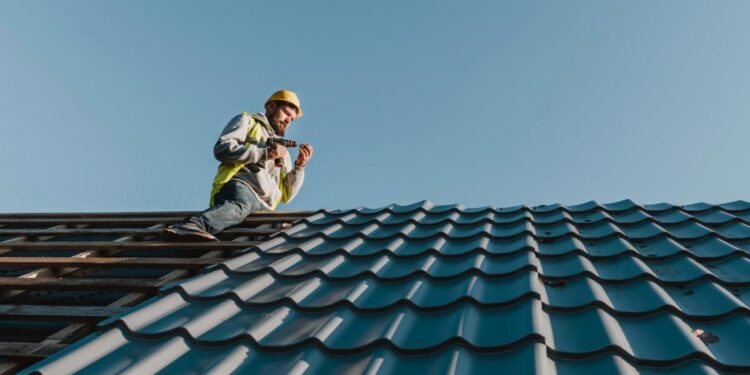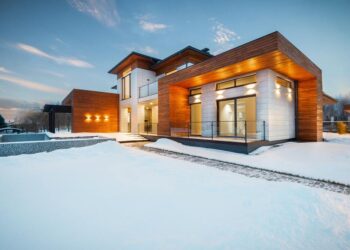Delving into the comparison of Asphalt vs Metal Roofs for Long-Term Durability, this article aims to provide a detailed insight into the key factors affecting the longevity and resilience of these roofing materials.

Asphalt Roofs
When it comes to durability, asphalt roofs are a popular choice for many homeowners due to their composition and longevity.
Composition of Asphalt Roofs
Asphalt roofs are typically composed of a fiberglass mat base saturated with asphalt and coated with mineral granules. This combination provides a strong and durable roofing material that can withstand various weather conditions.
Lifespan of Asphalt Roofs
The typical lifespan of an asphalt roof can range from 15 to 30 years, depending on the quality of the materials used and the level of maintenance performed. Proper installation and regular inspections can help extend the lifespan of an asphalt roof.
Impact of Weather Conditions
Weather conditions play a significant role in the durability of asphalt roofs. Extreme heat, cold, rain, snow, and hail can all affect the performance of an asphalt roof over time. Proper ventilation and insulation can help mitigate the effects of weather and prolong the life of an asphalt roof.
Metal Roofs
When it comes to long-term durability, metal roofs offer a different set of advantages compared to asphalt roofs. Metal roofs are known for their strength, resistance to harsh weather conditions, and longevity.
Materials Used in Metal Roofs
Metal roofs are typically made from materials like steel, aluminum, copper, or zinc. These materials are chosen for their durability, as they are able to withstand extreme weather conditions without deteriorating. Additionally, metal roofs are resistant to fire, rot, and insect damage, making them a long-lasting option for homeowners.
Maintenance for Metal Roofs
Compared to asphalt roofs, metal roofs require minimal maintenance. They are easy to clean and do not require frequent repairs or replacements. With proper installation and occasional inspections, metal roofs can last for decades without major issues. This low maintenance feature makes metal roofs a cost-effective choice in the long run.
Metal Roofs vs. Asphalt Roofs in Extreme Weather
Metal roofs excel in extreme weather scenarios such as heavy snow, hail storms, and high winds. Unlike asphalt roofs that can be easily damaged by hail or strong winds, metal roofs are designed to withstand these conditions. They are less prone to cracking, lifting, or leaking, providing better protection for your home during severe weather events.
Cost Analysis
When it comes to comparing the cost of asphalt versus metal roofs, there are several factors to consider. Let's delve into the initial installation costs, long-term cost implications, and the overall cost-effectiveness of both options over their lifespan.
Initial Cost Comparison
| Roof Type |
Initial Cost |
| Asphalt Roof |
$5,000
$10,000
|
| Metal Roof |
$10,000
$20,000
|
These are approximate costs and can vary depending on factors such as roof size, materials used, and labor costs.
Long-Term Cost Implications
While asphalt roofs may have a lower initial cost compared to metal roofs, they typically have a shorter lifespan of 15-30 years. This means that homeowners may need to replace an asphalt roof multiple times over the lifespan of a metal roof, which can result in higher long-term costs.
Cost-Effectiveness Over Lifespan
Metal roofs, although pricier upfront, are known for their durability and longevity, with a lifespan of 40-70 years or more. This longevity can result in cost savings over the long term as homeowners are less likely to incur the expense of frequent roof replacements.
Additionally, metal roofs require less maintenance, further contributing to their cost-effectiveness.
Environmental Impact
When it comes to the environmental impact of roofing materials, it's essential to consider factors such as manufacturing processes, recyclability, and overall sustainability.
Manufacturing of Asphalt Roofs
Asphalt roofs have a significant environmental impact during the manufacturing process. The production of asphalt shingles involves the extraction and processing of crude oil, which is a non-renewable resource. This process contributes to air pollution and greenhouse gas emissions, making it less environmentally friendly compared to other roofing materials.
Recyclability of Asphalt and Metal Roofs
- Asphalt Roofs: Asphalt shingles are not easily recyclable and often end up in landfills at the end of their lifespan. This contributes to environmental waste and pollution.
- Metal Roofs: Metal roofs, on the other hand, are highly recyclable. The metal used in roofing materials can be recycled repeatedly without losing its quality. This makes metal roofs a more sustainable option for those concerned about reducing waste and environmental impact.
Sustainability of Metal Roofs over Asphalt Roofs
Choosing metal roofs over asphalt roofs can have a positive impact on the environment in the long run. Metal roofs have a longer lifespan, require less maintenance, and are more energy-efficient in terms of reflecting heat. This can lead to reduced energy consumption and lower greenhouse gas emissions over time, making metal roofs a more sustainable choice for environmentally-conscious homeowners.
Wrap-Up

In conclusion, the durability of asphalt and metal roofs is influenced by various factors such as composition, maintenance, and environmental impact. Understanding these aspects can help homeowners make informed decisions when choosing between the two options.
FAQ Resource
Are metal roofs more expensive than asphalt roofs?
Metal roofs generally have a higher initial cost compared to asphalt roofs, but they offer greater durability and longevity, making them cost-effective in the long run.
Do extreme weather conditions affect metal roofs differently than asphalt roofs?
Metal roofs tend to perform better in extreme weather scenarios such as heavy snow, hail, and high winds compared to asphalt roofs, which may experience damage more easily.
Which roofing material is more environmentally friendly, asphalt, or metal?
Metal roofs are considered more environmentally friendly as they are recyclable and have a longer lifespan, reducing the overall environmental impact compared to asphalt roofs.

 In conclusion, the durability of asphalt and metal roofs is influenced by various factors such as composition, maintenance, and environmental impact. Understanding these aspects can help homeowners make informed decisions when choosing between the two options.
In conclusion, the durability of asphalt and metal roofs is influenced by various factors such as composition, maintenance, and environmental impact. Understanding these aspects can help homeowners make informed decisions when choosing between the two options.

 In conclusion, the durability of asphalt and metal roofs is influenced by various factors such as composition, maintenance, and environmental impact. Understanding these aspects can help homeowners make informed decisions when choosing between the two options.
In conclusion, the durability of asphalt and metal roofs is influenced by various factors such as composition, maintenance, and environmental impact. Understanding these aspects can help homeowners make informed decisions when choosing between the two options.














